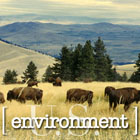
|
|||||||||||||||||
First Amendment to the US Constitution:
|
28 August 2006 U.S. District Judge John C. Coughenour has struck down a Bush administration policy loosening regulation of toxic pesticides. He found the rule change "striking in its total lack of any evidence of technical or scientific support for the policy positions ultimately adopted" and further chastised the government for failing to properly apply the Endangered Species Act. In 2001, the government began permitting the sale of regulated pesticides without consulting with the National Marine Fisheries Service or the U.S. Fish and Wildlife Service, as required by the Endangered Species Act (ESA). Judge Coughenour ordered the Environmental Protection Agency (EPA) to hold the consultations for at least 55 pesticides, with respect to their possible harm to salmon species. The government in 2004 instead simply altered the rules for procedure, permitting the pesticides to continue to be sold without the consultations ordered by the court and required by law. Judge Coughenour's ruling orders the EPA to follow both the previous ruling and the ESA. He also accused the administration of seeking to "ignore" the legal requirements of the Endangered Species Act. An attorney for the Oakland-based Earthjustice, one of the 9 groups suing the EPA and Interior Department over the rules change, said "Pesticides are driving America's wildlife toward extinction" and called the ruling a victory for checks and balances and the rule of law. Patti Goldman went on to say "this administration wants to remove the checks and balances that hold them accountable", referring to the consequences of not following the regulatory process laid out by the nation's key environmental laws. [s]
BACKGROUND: Rep. Brad Miller (D-NC) is to introduce an amendment to legislation currently under debate, which would restrict the executive branch's ability to gag scientists, manipulate their findings or demote those who disagree with official policy. The legislation would also require that scientists appointed to investigatory panels be selected for their credentials, not their political views. [Full Story] SCIENCE ABOVE TECHNOCRACY, FOR A FULLER FUTURE Science is in many ways an artform, but it is specifically and most importantly, the art of knowledge. It is not philosophy, not a study of how knowledge comes about, what it is, whether it can be trusted or whether we need to adjust our thinking; it is, instead, a direct study of the natural world, its tendencies, its evidence, and its capacity to work with us, for us and around us. [Full Story] GOV'T POLICY UNLAWFULLY CRIMINALIZES COMMENT ON SCIENTIFIC FACT The global environment is, of course, a global issue, one that touches every life on the planet, and the science about it should be open and available to all. Past government policy and existing federal law mean that such scientific evidence should be readily available to the public. But now, it appears that several agencies are laboring to silence scientists who are researching climate trends and alterations. [Full Story] POPULATION, LAND, AND CONFLICT As land and water become scarce and as competition for these vital resources intensifies, we can expect mounting social tensions within societies, particularly between those who are poor and dispossessed and those who are wealthy, as well as among ethnic and religious groups. Population growth brings with it a steady shrinkage of life-supporting resources per person. [Full Story] |
||||||||||||||||
|
|||||||||||||||||









